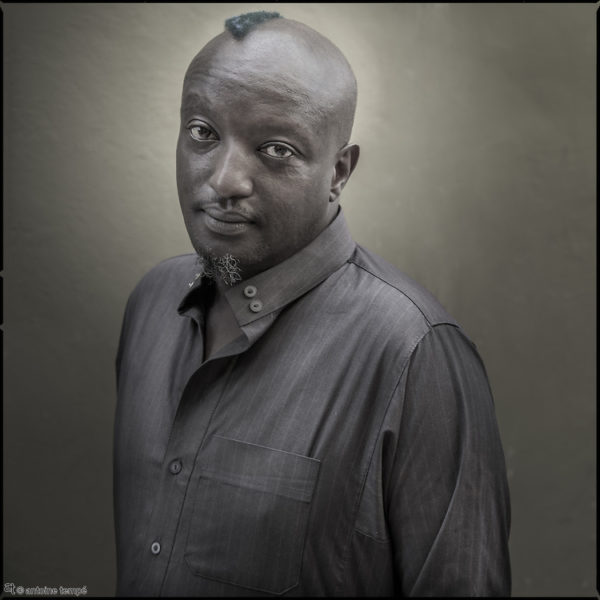
I did not first experience Binyavanga the way I had wished to. I did so like a thief. I was fascinated by both his writing and his social media persona. Unconventional. His points were always distracted by more points. Sometimes he came back to the original idea. Sometimes he did not. Disappearing in a fuzzy maze of rants. His legion of followers imploring him to stop. Others cheering him on. One of those was against Caine Prize. Commenters:
It was about time someone told them.
Why are you spiting in the plate you ate from? After you have become full?
You only needed to have read Binya’s work, interacted with his incredible imagination, to understand why he qualified—only him and a few like him—to question a powerful institution like the Caine Prize. He had led the founding of Kwani? to address these same issues of power, to create a local platform where writers would meet publishers at a table of equality. And one where, when work by a local author was published, there was no sense of indebtedness to neocolonial charity. Imagine how it was when Chinua Achebe snail-mailed his only copy of the Things Fall Apart manuscript to the UK, relying on the goodwill of an editor unknown to the ways of his people. The world was this close to losing one of the most influential literary works of all time.
For Binya, there was an urgent need to rethink these interactions, to balance power through creating spaces like Kwani?. And true to this urgent need to expand imagination beyond what is defined for us, books like Eva Kasaya’s Tale of Kasaya, taking us through the gut-wrenching reality of a house help in Kenya, would be published by Kwani? Trust. Eve Kasaya did not have the conventional writer’s pedigree before this book was published. She had a story. And there was a platform called Kwani? willing to give budding writers a chance. A point was made.
This point was also made earlier in Binya’s writings in G21 magazine, in “Discovering Home” where he wrote about a portrait of a Nandi woman hanging in his family home in Nakuru:
The artist has got the dignity right but the sexuality is European: it would be difficult for an African artist to get that wrong.
This was 1995 and Binya was already drawing attention to the appropriation of our stories and art by Westerners. And how when they did it, they missed the very details that were salient to us.
I met Binya at his book-signing event at Kenya Railway Station in 2012. I heard the news through Kwani?, took a country bus from Kisumu to Nairobi, and arrived in time to get a copy of One Day I Will Write About This Place. It was priced with the local man in mind. Five hundred Kenyan Shillings. A chance to meet the man in person. The set-up was apt for this occasion.
An Indian I met at the venue noted that everyone in attendance existed within some form of creative chaos. That they all looked the same. This was his way of acknowledging the absence of colonial rigidity that defined boundaries in settings like these. Settings where a giant was expected to teach us earthlings the secret sauce to his genius. This, we quickly learned, was Tusker beer. Binya showed up on the makeshift stage holding it. I put my phone away. I was not going to type any notes. This was not going to be a structured interaction. It was all about freeing our imagination. I grabbed a second Tusker and made a beeline for his autobiography.
Binya’s appeal was his down-to-earth nature. People who met him have testimonies of his generosity. Others like me, faithful social media disciples, mostly watched in awe as he spat wit online, stopped, started ranting in the dead of night, and, the next day, following it all up with brilliant ideas—a vivacious loop of unpredictability. A hurricane. All you needed to do was take a seat at this table with your fork and knife.
A few years back, I was struggling through Yvonne Adhiambo Owuor’s Dust. I had taken two long flights with Dust as my sole companion. Could not crack it beyond a few pages. I sent Binya a quick message. He replied promptly, told me to “allow it to speak to you.” I should have taken his advice. I am taking it now. Funny thing is I knew he would reply. With any other author of his calibre, I would have held my breath. But I was still surprised. Thrilled that he did.
Binya’s writings during his time in South Africa is a window into his personal growth. He was a man who had been through the spin cycle of life. A story of resilience: staying on course when all pointed to failure. One of his publications, “Thank you, SA, for caring for me, says Kenyan student,” on Business LIVE, is a catalogue of thank-yous to people who gave him a bed to lay his head when he was a struggling student in the country. He writes about getting a bottle broken on his head when he stands up to a bully. He writes about South Africa convulsing through riots leading to Mandela’s release. How he is gripped with fear. He has outstayed his visa and everyone looks suspicious. He laments the walls separating Africans and irresponsible governments who let their people drown.
Binya’s perception also lies in his open invitation into his family through his writing. We are growing up with his sister Ciru, leaping through the daily joys of their upper middle class upbringing. We are seated with Binya, observing his mother and uncles learning the complexities of a mixed heritage from multiple African countries. He writes about his Baba:
Then I am racked with guilt and am avoiding Baba. He has been gracious so far—has said nothing. All that wasted money on my degree.
His relationship with Baba, about education, is something all of us, children raised by babas who believe that formal education is the only way out of poverty, have experienced. At this point he is one of us. Or the teenager next door. Through writing he is getting a second chance at life. Self-motivation. Self-education. Reading all novels that he comes across. Who are we not to be awed by this man at a crossroads in his life, let down by an education that was too structured for his creative brain, before harnessing his innate talent to global recognition? This resonates loudly with many who have been let down by the colonial structure of African education systems which emphasize obedience over creativity. The systems and their enforcers: parents, teachers, professors. We are getting inspired to challenge it. To think out of imposed and inherited mental boundaries.
Binya’s relationship with Baba also brings to fore the complexity of his sexuality. We witness how his male identity is strongly tied to Baba, and how breaking the tie to discover his true self is a complex, layered process. It is no surprise that he comes out to his mother in 2014: a son longing, wishing for what would have been, that this opportunity presented itself earlier. In a different, more accepting world, it would have, face-to-face. Son to mother. Mother to son.
There are very few books where a writer opens the doors this wide into his and his family’s lives, taking readers on a spiritual and emotional journey like Binya’s. One Day I Will Write About This Place introduced us to intimate stories in Nakuru. Prior to the book, I would have considered the town a stopover for bathroom breaks and food, for travellers on country buses between Kisumu and Nairobi. I never imagined the town had any artistic life until Binya wrote about finding his childhood and teenage years in it, with a similar rebellious leaning as in JD Salinger’s Catcher in the Rye. Complex issues of identity, belonging, politics and culture across decades and in multiple African countries, woven unapologetically in that playful style that only Binya could.
Through this beautiful journey we were all struck by this force of nature. We held our breaths excited, pondering what might come next out of this inspiring man.
Go well, Binya.
ABOUT THE WRITER
Norbert Odero is a Kenyan scientist and writer currently based at Duke University, USA. His writing has appeared in The Elephant, Africa Is a Country, and Brittle Paper, among other spaces.








COMMENTS -
Reader Interactions